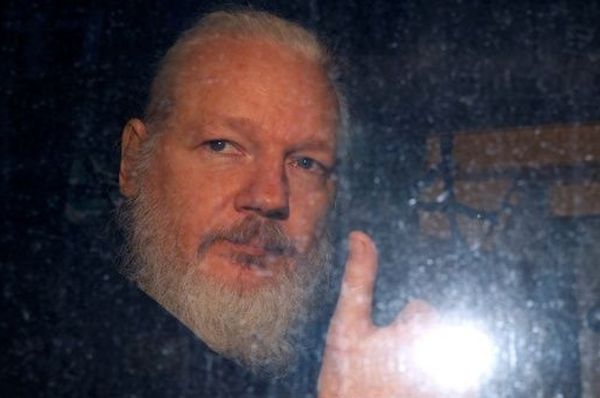
WikiLeaks founder Julian Assange was arrested by British police Thursday after U.K. law enforcement officials were “invited into the embassy by the Ambassador, following the Ecuadorean government’s withdrawal of asylum.”
Assange’s attorney, Jen Robinson, said that, in addition to being arrested for breach of bail conditions, Assange is also being processed in relation to a U.S. extradition request on a warrant that was issued in December 2017 for conspiracy with Chelsea Manning in early 2010.
“Julian Assange, 47, has today, Thursday 11 April, been arrested by officers from the Metropolitan Police Service (MPS) at the Embassy of Ecuador,” London’s Metropolitan Police said, adding that they were granted access to Assange, who has been living at the London embassy since 2012.
Assange shouted “the U.K. has no sovereignty. The UK must resist,” while he was being forcibly removed from the Ecuadorean embassy, according to Edward Snowden citing a Ruptly report and stating that the WikiLeaks founder’s detainment was arbitrary and ruled a violation of human rights by the United Nations.
Former Ecuadorean President Rafael Correa also commented, on Twitter, condemning the arrest of Julian Assange and stated that his successor was “greatest traitor in Ecuadorean and Latin American history.”
According to CNN, citing an anonymous source Assange may require medical attention and will likely make a court appearance at 2:00 p.m. London time. WikiLeaks also disclosed, to the news agency, that the organization was not privy to the whereabouts of its founder.
British Home Secretary Sajid Javid confirmed that Assange was in police custody and “rightly facing justice in the UK.”
A statement from Ecuadorean President Lenin Moreno declares that the Latin American country is “generous” and “a nation with open arms.”
The statement
Ours is a government respectful of the principles of international law, and of the institution of the right of asylum. Granting or withdrawing asylum is a sovereign right of the Ecuadorean state, according to the international law.
Today, I announce that the discourteous and aggressive behavior of Mr. Julian Assange, the hostile and threatening declarations of the allied organization, against Ecuador, and especially, the transgression of international treaties, have led the situation to the point where the asylum of Mr. Assange is unsustainable and no longer viable.
Ecuador sovereignly has decided to terminate the diplomatic asylum granted to Mr. Assange in 2012.
For six years and 10 months, the Ecuadorean people have protected the human rights of Mr. Assange and have provided for his everyday needs at the facilities of our Embassy in London.
When I became President of Ecuador I inherited this situation and decided to adopt a protocol to set the daily life rules at the Embassy, which is the less than anyone may expect from a guest hosted at his own house.”
Ecuador has fulfilled its obligations in the framework of the international law.
On the other hand, Mr. Assange violated repeatedly, clear cut provisions of the conventions on diplomatic asylum of Havana and Caracas; despite the fact that he was requested on several occasions to respect and abide by these rules.
He particularly violated the norm of not intervening in the internal affairs of the other states.
The most recent incident occurred in January 2019, when WikiLeaks leaked Vatican documents.
Key members of that organization visited Mr. Assange before and after such illegal acts.
This and other publications have confirmed the world’s suspicion that Mr. Assange is still linked to WikiLeaks and therefore involved in interfering in internal affairs of other states.
 Escambray ENGLISH EDITION
Escambray ENGLISH EDITION





Escambray reserves the right to publish comments.